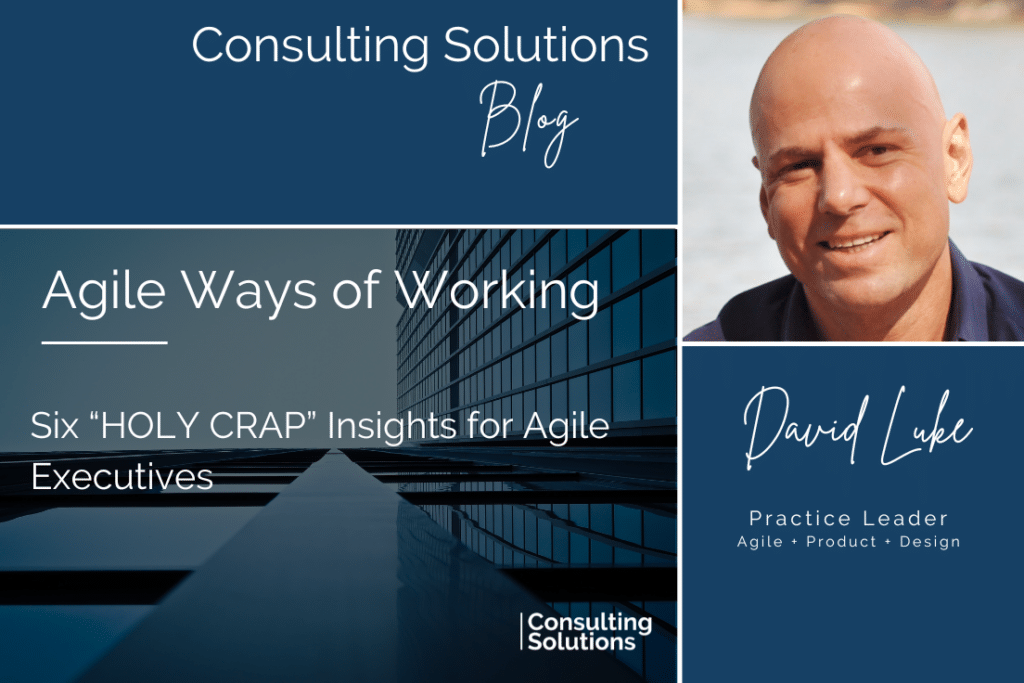Sooooo… you are interested in Agile, you’ve heard about how efficient a product model is, and you want to undertake a transformation. While many executives have a good idea of the disruption a successful transformation will create, many underestimate just what they are signing up for. Since I’ve servant-led quite a few organizations through both large and small transformations, I’m sharing these six informed insights to help make such transformations easier:
- SET YOUR AND YOUR ORGANIZATION’S EXPECTATIONS: AGILE DOESN’T MAKE THINGS CHEAPER, EASIER, OR PRETTIER. It WILL, however, expose the processes, people, and teams that you need to work and focus on. Embrace this reality and work on a high-level plan to ultimately get to cheaper, easier, and prettier.
- BE IN IT TO WIN IT. Too often, we see executives who push transformation responsibilities down their respective organizations—”Oh, <<insert role or person here>> can handle the transformation and I’ll just pop in to show my support.” Understand that the tone set from the top is the single most important factor in transformation success. This means that it’s your job to create a collaborative environment that is rich with both the safety and transparency needed to support Agile and product teams. Empower your teams, lead by example, and create a culture of continuous improvement.
- DEVELOP A COLLABORATIVE STRATEGY, BUT BE PREPARED TO ADAPT TO ORGANIZATIONAL FEEDBACK. Start by working through a design workshop to identify who your players are, how you can reduce their pain, and what priority you are going to give their work. Some say, “start small” while others say, “launch a business-wide transformation effort.” All organizations are different, so take the pulse of yours and plan accordingly. Also, prepare for whatever plan that you choose to be adjusted as work begins and new ideas or unexpected challenges are discovered.
- IDENTIFY YOUR BUSINESS ALLIES UP FRONT. This is where many companies fail: IT wants to go Agile, but the business has no interest in undergoing such a transformation, usually due to lack of context or a clear value proposition. In fact, the business side views Agile simply as extra work or “just another process I need to follow.” The onus is on you as the executive to gain the business’s support, something that starts by clearly communicating the benefits and collaborating to involve their people from the beginning, so they are an integral part of the transformation.
- DETERMINE IN ADVANCE WHAT YOUR EXPECTED OUTCOMES ARE AND HOW TO MEASURE THEM. Don’t get fancy, as a few simple metrics tell more than a complex array of numbers. As the transformation matures, reveal more metrics if you believe the organization can absorb the change. Oftentimes, organizations will purchase a tool with myriad metrics and then attempt to use them all. Don’t fall into this trap—again, keep it simple and measure only what is important.
- MAKE AGILE AND PRODUCT A DEFINED CAREER DESTINATION IN YOUR COMPANY. Too often, we see Agile and product duties as an addition to a person’s current role. Work with HR, your learning team, and the overall business to create a career for Agile and product professionals. Include entry to executive levels, career milestones to be achieved, and a comprehensive learning and experience program. You’ll attract and retain better Agile and Product talent by creating an environment for their professional success.
While this list is by no means comprehensive, it does convey some of the most important considerations that I would want an executive to buy into before taking the plunge into an Agile transformation. One size clearly doesn’t fit all here, and be advised that subscribing to a rigid, prescriptive method or process typically results in less-than-optimal results. Agile and product transformations are a true journey—and it’s up to you to set the stage so that the journey achieves your intended goals.
CONSULTING SOLUTIONS has helped many companies embark on their Agile and product journeys. For more insights and conversation, please reach out to me at http://linkedin.com/in/davidcluke.
